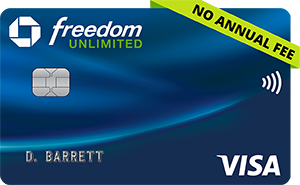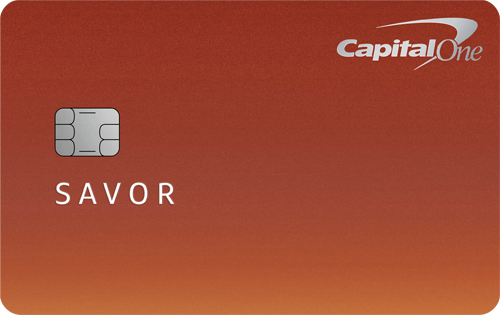Chase Freedom Unlimited vs. Capital One Savor Card: Earn Cash Back on Everyday Spending

When shopping for a new rewards credit card, the Chase Freedom Unlimited® and Capital One Savor Cash Rewards Credit Card stand out as popular options for consumers with good to excellent credit.
Both cards offer compelling rewards structures without annual fees, making them attractive choices for everyday spending. They’re two of the best cash-back credit cards available.
Let’s compare the Chase Freedom Unlimited and Capital One Savor Card by looking at welcome bonuses, rewards, redemption options, benefits and fees to help you determine which better aligns with your spending habits.
How the Cards Compare: Chase Freedom Unlimited vs. Capital One Savor
Side By Side Comparison
Annual Fee
Purchase and Balance Transfer APR
Welcome Bonus
Ongoing Rewards
Earn unlimited 5% cash back on hotels, vacation rentals and rental cars booked through Capital One Travel.
Earn unlimited 3% cash back at grocery stores (excluding superstores like Walmart® and Target®), on dining, entertainment and popular streaming services, plus 1% on all other purchases
Pros & Cons
- Higher than average base rate of 1.5%
- Elevated 3-5% cash back on select categories
- Valuable bonus opportunity
PROS
- No ability to transfer points to travel partners unless you have an eligible annual-fee Chase card
- Charges a foreign transaction fee
CONS
- No annual fee or foreign transaction fees
- Generous welcome offer and bonus rewards earning
- Introductory APR offer
PROS
- Few travel and purchase protections
- Low base rewards rate
- Streaming services bonus category is limited
CONS
Learn More
Welcome Bonuses
Most cash-back cards offer welcome bonuses, which may include a low APR for a set period and/or a one-time cash bonus after meeting a spending requirement in the first months of account opening. Both the Freedom Unlimited and Savor Card have strong welcome offers for new customers.
Chase Freedom Unlimited Welcome Bonus
The Freedom Unlimited welcome bonus includes the following:
- $200 one-time bonus after you spend $500 on purchases within the first three months of account opening
- 0% Intro APR on Purchases and Balance Transfers for 15 months, then 18.99% - 28.49% Variable
Capital One Savor Welcome Bonus
The Savor Card welcome bonus includes the following perks:
- For a limited time, earn $300 in welcome bonuses. Enjoy a $100 credit to use towards flights, stays and rental cars booked through Capital One Travel during your first cardholder year. Plus, earn a $200 cash bonus once you spend $500 on purchases within the first 3 months from account opening.
- 0% intro on purchases and balance transfers for 12 months, then 19.24% - 29.24% (Variable)
CardCritics™ Opinion
The Chase Freedom Unlimited and Capital One Savor Card have similar welcome bonuses, and also offer an intro APR. The Freedom Unlimited’s intro APR period is slightly longer than the Savor Card’s, so if that’s an important feature to you, the Freedom Unlimited is the better deal.
Earning Rewards
The Freedom Unlimited and Savor Card are both popular for their rewards programs. You can earn unlimited cash back on all purchases, and both have bonus categories that allow you to earn higher rewards on certain purchases.
How To Earn Rewards With Chase Freedom Unlimited
You’ll automatically earn at least 1.5% cash back on all purchases (which is why the Freedom Unlimited is one of the best Chase credit cards, but some purchase categories earn more:
- 5% cash back on travel purchased through Chase Travel℠
- 3% cash back on dining at restaurants, including takeout and eligible delivery services.
- 3% cash back on drugstore purchases.
- 1.5% cash back on everything else
Although the Freedom Unlimited is marketed as a cash-back credit card, it actually earns Chase Ultimate Rewards® points that you can redeem for cash back, travel, gift cards and more.
There are no purchase limits that will hinder the amount of cash back you can earn, and your points don’t expire as long as your account is open and in good standing.
How To Earn Rewards With Capital One Savor
All purchases with the Savor Card earn at least 1% cash back without spending limits, but some purchases qualify for higher rewards:
- 8% cash back on qualifying Capital One Entertainment purchases
- 5% cash back on hotels, vacation rentals and rental cars booked through Capital One Travel
- 3% cash back on dining, grocery stores, entertainment and popular streaming services
- 1% cash back on everything else
There are no caps on the amount of cash back you can earn in any category, and rewards will remain valid for the lifetime of the account.
CardCritics™ Opinion
Both cards have competitive rewards structures, but the Freedom Unlimited has a higher base rate for non-bonus categories (1.5% cash back on all purchases), compared to the Savor Card’s 1%.
The Savor Card shouldn’t be overlooked if you spend a lot in its bonus categories. Earning 3% cash back on groceries, dining and streaming service purchases, for example, can be significant for many families. I use the Savor Card for groceries and streaming services (which are high-cost, regular purchases in my household) and the Freedom Unlimited for most other purchases to take advantage of the higher cash back.
Redeeming Rewards
Earning your rewards is only the first part of the equation. The Chase Freedom Unlimited and the Capital One Savor Card have similar options for redeeming cash back.
How To Redeem Rewards With Chase Freedom Unlimited
You can redeem Chase Ultimate Rewards points from the Freedom Unlimited in several ways, including:
- Statement credit: Redeem points for cash back on your next statement
- Bank deposit: Deposit the cash value of your points into your bank account
- Shop through retailers: Use your points to shop on Amazon, Apple or with PayPal
- Redeem for gift cards: Purchase gift cards for third-party vendors; in some cases, you can get gift cards at a discounted rate
- Purchase travel: Use points to book flights, hotels, rental cars and more through Chase Travel℠
How To Redeem Rewards With Capital One Savor
There are multiple options available to redeem your rewards with the Savor Card, including:
- Cash: Redeem your rewards for a statement credit or direct deposit to your bank account
- Experiences: Purchase tickets to sporting events, concerts and other experiences through Capital One Entertainment
- Book a trip: Redeem rewards for hotels, flights, vacation rentals or rental cars through Capital One Travel
- Redeem with PayPal: Use your rewards to pay for purchases at millions of online stores using PayPal
- Shop through Amazon: Apply your rewards to Amazon.com orders at checkout
- Get gift cards: Purchase digital or physical gift cards for third-party merchants with your rewards; you may be able to do so at a discounted rate
- Cover purchases: You can get reimbursed for specific purchases on your statement using your rewards
CardCritics™ Opinion
Both cards have similar rewards redemption options, giving you plenty of flexibility with how you can benefit from the cash back you’ve earned. I almost always use cash back rewards on both cards as statement credits or to purchase gift cards at a discounted cash value. If I know I need to buy dog food and Chewy has a discounted gift card through a card’s rewards program, for example, it’s an easy decision and a good way to save extra.
Card Benefits
In addition to earning rewards, both cards offer additional benefits and perks like fraud protection and credit score tracking. These benefits can play an important role in helping you determine which card is best for you.
Chase Freedom Unlimited Benefits
Chase Freedom Unlimited benefits include:
- Purchase protection
- Extended warranty
- Trip cancellation and interruption insurance
- Car rental insurance (secondary coverage)
- Travel and emergency assistance,
- Partner benefits, including six months of complimentary access to DashPass (activate by Dec. 31, 2027) and 2% total cash back on Lyft rides through Sept. 30, 2027
Capital One Savor Benefits
Some of the Capital One Savor Card’s most notable benefits include:
- No foreign transaction fees
- Extended warranty
- Travel accident insurance
- Complimentary concierge service
- Hertz Five Star® Status* (enrollment required)
CardCritics™ Opinion
Deciding which perks are best comes down to personal preference. If you plan to travel overseas or make international purchases, for example, you may prefer Capital One Savor Card’s no foreign transaction fees and travel accident insurance.
Meanwhile, some customers may strongly prefer the Freedom Unlimited’s broader protections or enjoy partner benefits from DoorDash and Lyft.
Fees and Costs
While perks are an important part of deciding which card is best for you, it’s also important to consider potential fees and costs.
Chase Freedom Unlimited Fees and Costs
These are the important fees and costs to consider with the Chase Freedom Unlimited card:
- Annual fee: $0
- APR: 0% Intro APR on Purchases and Balance Transfers for 15 months, then 18.99% - 28.49% Variable
- Balance transfer fee: Intro fee of either $5 or 3% of the amount of each transfer, whichever is greater, on transfers made within 60 days of account opening. After that: Either $5 or 5% of the amount of each transfer, whichever is greater.
- Cash advance fee: Either $10 or 5% of the amount of a transaction (whichever is greater)
- Foreign transaction fee: 3% of the amount of each transaction in U.S. dollars
- Late payment fee: Up to $40
Capital One Savor Card Fees and Costs
These are the fees and costs to keep in mind when considering a Capital One Savor Card:
- Annual fee: $0
- APR: 0% intro on purchases and balance transfers for 12 months, then 19.24% - 29.24% (Variable)
- Balance transfer fee: Introductory fee of 3% of the amount of each transferred balance that posts to your account during the first 12 months that your account is open. After that, 4% of the amount of each transferred balance that posts to your account at a promotional APR that Capital One may offer you at any other time. None for transferred balances at the purchase APR after the first 12 months that your account has been open.
- Cash advance fee: Either $5 or 5% of the amount of each cash advance, whichever is greater
- Foreign transaction fee: None
- Late payment fee: Up to $40
CardCritics™ Opinion
When comparing fees, the Savor Card has a slight edge with no foreign transaction fees, making it the better choice for international travelers.
Otherwise, both cards are neck-and-neck, with no annual fee and comparable APR ranges.
How To Choose Between Chase Freedom Unlimited vs. Capital One Savor Card
When you’re trying to decide between a Chase Freedom Unlimited and a Capital One Savor Card, it’s important to remember that you don’t necessarily have to.
I’ve had both cards for several years, and I benefit from using both regularly. I use my Savor Card for most grocery purchases and to pay for streaming services, and I like more of the vendors that have extra cash back offers through Capital One. I also regularly use my Freedom Unlimited for the 1.5% cash back on all other purchases.
All this said, if you have to choose, it’s important to determine which card will benefit you most. Both are fairly similar in terms of fees, costs, benefits and redemption options, so consider which perks are the best fit for how you shop and spend.
For Capital One products listed on this page, some of the benefits may be provided by Visa® or Mastercard® and may vary by product. See the respective Guide to Benefits for details, as terms and exclusions apply.
*Upon enrollment, accessible through the Capital One website or mobile app, eligible cardholders will remain at that status level through the duration of the offer. Please note, enrolling through the normal Hertz Gold Plus Rewards enrollment process (e.g. at Hertz.com) will not automatically detect a cardholder as being eligible for the program and cardholders will not be automatically upgraded to the applicable status tier. Additional terms apply.
The information related to the Chase Sapphire Reserve® was collected by CardCritics™ and has not been reviewed or provided by the issuer of this product/card. Product details may vary. Please see issuer website for current information. CardCritics™ does not receive a commission for this product
Frequently Asked Questions About the Chase Freedom Unlimited vs. Capital One Savor
What are the disadvantages of the Chase Freedom Unlimited?
While the Chase Freedom Unlimited is a popular card, there are a few disadvantages to consider. One main drawback is the card’s 3% foreign transaction fee, so it’s not a good choice if you travel abroad.
In addition, you can’t transfer points from the Freedom Unlimited to Chase’s airline and hotel partners. However, if you have a premium Chase credit card that earns Ultimate Rewards, such as the Chase Sapphire Preferred® Card or Chase Sapphire Reserve®, you can pool your points in that account and then transfer them to partners.
Is Capital One Savor worth it?
The Capital One Savor Card can be worth it for those who want unlimited cash back and who spend a lot in the card’s bonus categories (dining, groceries, entertainment and select streaming services). It’s one of the best Capital One credit cards with no annual fee.
Is it hard to get the Capital One Savor card?
To be considered for the Capital One Savor Card, you’ll need at least a good credit score (a FICO score of 670 or higher). Capital One also defines “good” credit as someone who hasn’t declared bankruptcy or defaulted on a loan in the past five years, and who hasn’t been more than 30 days late on any payment within the past year on a credit card or loan.
Is the Chase Freedom Unlimited hard to get?
The Freedom Unlimited is geared toward customers with good to excellent credit, but Chase will look at other factors when making its approval decision, including your overall financial profile and the number of cards you’ve recently opened. Chase’s unofficial 5/24 rule means that you won’t be approved for most Chase cards if you’ve opened five or more personal credit cards from any issuer within the last 24 months.














